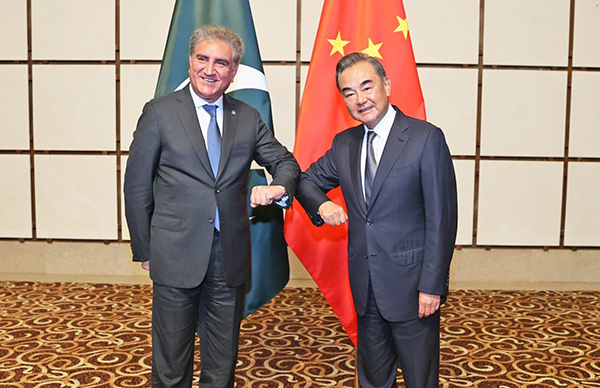
“Iron Brothers” Enhance Engagement
An IMR ReportChinese foreign minister, Wang Yi and his Pakistani counterpart, Shah Mahmood Qureshi met, on 21 August, in Hainan for the two-day second round of China-Pakistan strategic foreign ministers’ dialogue.
Qureshi’s visit was one of the first high-profile diplomatic visits to China as the country emerged from the Covid-19 pandemic. It was a time when both Beijing and Islamabad’s ties with New Delhi had taken a nosedive over the Sino-India border tension in eastern Ladakh, and abrogation of Article 370 in Kashmir.
The last China-Pakistan foreign ministers’ strategic dialogue was held in March, 2019. Zhao said it had led to consensus on several matters and played an important role in the development of bilateral relations.
Chinese foreign ministry spokesperson, Zhao Lijian said the dialogue mechanism was a platform for the two “iron brothers” to coordinate exchanges in various fields, discuss policy suggestions on the bilateral ties and enhance coordination and communication on international and regional issues.
ALSO READ: China Oppposes Pak Unilateral Action on Kashmir
Wang and Qureshi discussed the progress of the China-Pakistan Economic Corridor (CPEC), the flagship project under President Xi Jinping’s Belt and Road Initiative (BRI), the ambitious connectivity venture that aims to connect China with Asia and Europe through infrastructure like highways and ports.
The bilateral meeting came in the backdrop of Beijing, in July, for the first time, urging Afghanistan, Nepal and Pakistan to carry “four-party cooperation” in fighting the coronavirus pandemic and continue to build projects under the BRI including the CPEC.
In a television interview preceding the meeting, prime minister Imran Khan said: “It should be clear that our future is connected with China… China also needs Pakistan very much. China is our only friend which has remained politically steadfast with Pakistan during good and bad times.”
China is the largest foreign investor in Pakistan and accounted for $27 million of the $114.2 million, which entered into Pakistan’s economy in July 2020.
Qureshi, was earlier in news for his broadside at Saudi Arabia that led Imran Khan to depute Army chief Gen Qamar JavedBajwa to firefight in Riyadh.
Discussion Points
Qureshi went to China with a three-point plan in hand that included scaling up military cooperation between the two countries. The People’s Liberation Army and Pakistan army had, in August 2019, signed a pact in Rawalpindi for defence cooperation and capacity building of Pakistan Army. Islamabad is keen on establishing a joint military commission with China.
The Imran Khan government was also looking at discussions to expedite implementation of phase 2 of the China Pakistan Economic Corridor, or CPEC projects.
ALSO READ: PAKISTAN: Emerging Partnership Amongst Subjugated Sindhis, Balochis and Mohajirs
Pakistan wants China to help upgrade the infrastructure in Sindh, Pakistan-occupied Kashmir (POK) and the Gilgit-Baltistan region..
Qureshi also sought some sort of transport corridor between Nepal and Pakistan for trade with Kathmandu. Nepal had last year signed nearly 20 infrastructure-building agreements with China during President Xi’s visit including an upgraded all-weather road connection that includes building tunnels through the Himalayas.
India figured prominently in the discussions, when Beijing and Islamabad’s ties with New Delhi were at an all-time low due to tensions along the Line of Actual Control (LAC) and the Kashmir issue.
Joint Statement
A joint statement was issued after the dialogue and soon after President Xi Jinping was quoted as saying that China and Pakistan are “good brothers” and “good partners”, and that the economic corridor between the two countries, which passes through Pakistan-occupied Kashmir (PoK), is key to forging even closer ties between Beijing and Islamabad.
China and Pakistan believe a “peaceful, stable, cooperative and prosperous South Asia was in common interest of all parties”, the statement said. It added: “Parties need to settle disputes and issues in the region through dialogue on the basis of equality and mutual respect.”
Both also agreed “to strengthen cooperation on the Afghan issue” and “appreciated the efforts made by the Afghan government and the Taliban to initiate the Intra-Afghan negotiations.” The press release said they encouraged parties in Afghanistan to “seize this historic opportunity and commence the Intra-Afghan Negotiations at the earliest leading to durable peace and stability in Afghanistan.”
Support Over Kashmir
The Kashmir issue figured in the second strategic dialogue. India objected to their joint statement’s reference to Kashmir.
China had told Pakistan it opposed any “unilateral” action that complicated the situation in Kashmir, after Pakistani foreign minister Shah Mahmood Qureshi briefed his Chinese counterpart Wang Yi of his country’s concerns regarding the situation in the Indian state.
“The Chinese side reiterated that the Kashmir issue is a dispute left over from history between India and Pakistan, which is an objective fact, and that the dispute should be resolved peacefully and properly through the UN Charter, relevant Security Council resolutions and bilateral agreements. China opposes any unilateral actions that complicate the situation,” it said.
China had issued a similar statement immediately after India scrapped Kashmir’s special status in August last year. Since then, it has sought to raise the Kashmir issue at the UN Security Council on Pakistan’s behalf several times, but without much success.
China’s comments on “unilateral actions” echoed Beijing’s multiple statements last year that hit out at India’s move to dilute Article 370 and end statehood for Jammu and Kashmir. China had also opposed the creation of the Ladakh union territory and said the move had “undermined China’s sovereignty” as it included Aksai Chin and areas claimed by China, although the internal reorganisation did not change India’s external boundaries.
They are likely to have discussed the tense standoff between India and China along their disputed border. Pakistan and China share a growing mutuality of interests against India. At Hainan, China described Pakistan as its “staunchest partner” and the two sides pledged to “collectively take measures to safeguard their common interests.” India cannot dismiss these words as effusive rhetoric that is routinely articulated at China-Pakistan meetings. It must prepare for greater coordination and cooperation between the two countries in any possible military action against India henceforth.
According to information available with New Delhi, China has already assured Islamabad full coordination and support over the Kashmir issue to Islamabad. The Imran Khan government wantED Beijing to go one step further and raise the Kashmir issue at the UN General Assembly session in September. Last year, Turkish President Recep Tayyip Erdogan and then Malaysian Prime Minister Mahathir Mohamad were the only ones to go that far.
China-Pakistan Economic Corridor
The $74 billion China-Pakistan Economic Corridor (CPEC)infrastructure projects in Pakistan proposed under CPEC are central to China’s wider Belt and Road Initiative to develop land and sea trade routes in Asia and beyond.
In the recorded message addressed to his Pakistani counterpart ArifAlvi, Xi said the CPEC, “a landmark project” under the Belt and Road Initiative (BRI), is of “great importance to promoting in-depth development of the China-Pakistan all-weather strategic cooperative partnership and forging a closer China-Pakistan community with a shared future”.
India has consistently opposed CPEC because it passes through PoK. CPEC is among the new irritants and concerns for India’s ties with China, but Beijing has refused to address this issue, arguing it is only an economic project.
In early August, Pakistan’s National Economic Council cleared a $6.8 billion project – its costliest CPEC project till date- to upgrade its railway lines for the Islamabad-Beijing link. The CPEC seeks to connect Gwadar Port in Pakistan’s Balochistan with China’s Xinjiang province.
China confirmed, on 21 August, as the two foreign ministers met, that it would push on with rail and power projects agreed with Pakistan in order to revitalise the state’s economy.
China Defends Pakistan Over Terror
China staunchly defended Pakistan’s record in fighting terrorism, on 11 September, saying its all-weather ally has made “tremendous efforts and sacrifices”, countering calls by India and the US that Islamabad must ensure that its territory is not used for terror activities.
This was after India and the US in a joint statement, after the 17th meeting of the India-US Counter Terrorism Joint Working Group and the third session of the India-US Designations Dialogue held on September 9-10, denounced the use of terrorist proxies and strongly condemned cross-border terrorism in all its forms.
Chinese foreign ministry spokesman Zhao Lijian said that terrorism was a common challenge faced by all countries and Pakistan had made “tremendous efforts and sacrifices” in fighting terrorism.
Locals Up In Arms Against China & Pakistan’s Dam Plots
People in Muzaffarabad city of Pakistan occupied Kashmir (PoK), on 24 August, protested opposing construction of mega-dams by Chinese firms on Neelum-Jhelum river.
Over a thousand people from the city and other parts of PoK took out a torch rally and chanted slogans like ”Darya Bachao, Muzaffarabad Bachao” (Save River, Save Muzaffarabad) Committee” and “Neelum-Jhelum behne do, humeinzindarehne do” (let the Neelum and Jhelum rivers flow, let us live).
Pakistan and its ‘all-weather friend’ China have signed agreements to construct Azad Pattan and Kohala Hydropower Projects in Pakistan Occupied Kashmir.
Azad Pattan Hydel Power Project of 700.7 megawatts of electricity as part of the China-Pakistan Economic Corridor (CPEC) was signed on July 6, 2020. The $1.54 billion projects will be sponsored by the China Gezhouba Group Company (CGGC). The Kohala Hydroelectric Power Project which will be built on Jhelum River is roughly 7 km upstream of Azad Pattan Bridge in the Sudhanoti District of PoK and 90 km from Islamabad, the capital city of Pakistan.
The project expected to be completed by the year 2026 will be sponsored by China Three Gorges Corporation, International Finance Corporation (IFC) and Silk Road Fund. Pakistan and China are jointly destroying the natural resources of PoK and Gilgit Baltistan in the wake of China Pakistan Economic Corridor. The discontent in the occupied territories is high against Pakistan and China.

















